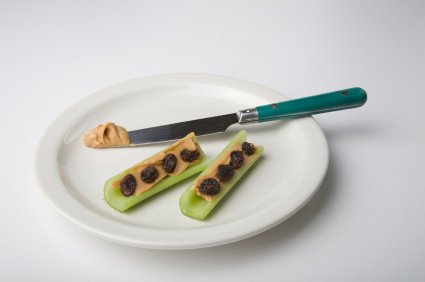 How do our kids know that food is good for them? It seems that they can uncannily pick out the most nutritious item on their plates to turn up their noses at. That is especially true at our house! Whatever it is that gives them the inside scoop, as parents we need to find ways to counteract it.
How do our kids know that food is good for them? It seems that they can uncannily pick out the most nutritious item on their plates to turn up their noses at. That is especially true at our house! Whatever it is that gives them the inside scoop, as parents we need to find ways to counteract it.
While their may be kids who love their veggies, they seem to be few and far between… at least, none of them live at my house. Instead, we try to make things interesting enough so the kids will eat more of what is good for them and less of what isn’t.
After many years of fighting with our kids about eating, sneaking vegetables into something where they wouldn’t be noticed, and just about pulling my hair out, I have come to a couple of conclusions. Are you ready? Presentation is important. Yes, it’s true. Kids like to see something nice on their plates. I don’t mean to arrange food like you’d get at a high end restaurant… I mean it should be colorful and preferably bite size. This is why the original concept of fruit cocktail got the reputation of being great for kids… it was bite size and full of color and different shapes.
Japan seems to have it . Do a search for "bento boxes" and you will be amazed at the artistry and color in these little lunch boxes. Does it look fun to eat? You bet! Who wouldn’t want to eat a boiled egg molded to look like a teddy bear and rice shaped into one of the Mario Brothers? While you certainly don’t have to go this far, you can learn a lot from looking at bento box presentations.
The basic concept is colorful food cut into small pieces and arranged to look appealing. Add a small pick or chopsticks and the food is a challenging game as well. Include some sauce or dip in a small container that they can dip the pieces in. Dipping rates highly with my five year old. He freely admits he’ll eat almost anything if he can dip it.
Here are some simple recipes. Make sure your child does not have any food allergies before trying.
Ants on a Log
This one is so simple that my kids love. All you need is a little celery, peanut butter and raisins. The picture in this article makes it self explanatory. My youngest son is allergic to peanut butter so we have to keep him away, but my oldest son loves it. He likes the taste and the crunchyness.
Finger Omelets
Omelets are different in bento boxes. The eggs are made very flat, and then rolled into something that can easily be handled by chopsticks or fingers. They don’t add fillings like we do here, but you could put a thin layer of cheese and maybe a little spinach in there before rolling. Call them Finger Omelets and you’ll have a new taste sensation your kids will love.
The other major concept that I realized is that kids like to be involved with their food. This can be taken care of by letting them help prepare their food, making the food creative so they can interact with it while they eat, or by making it a fun surprise.
Kids are fascinated with learning new skills. If it is time for them to learn how to spread something on bread or peel a carrot, all the better. Even if what you are preparing is beyond their skill levels, encourage them to watch and ask questions. You may be amazed at some of the questions they will come up with. Let them taste a bite or two as things are being prepared.
Sandwich Paintings
One way to let them play with their food while eating it is to let them create pictures with it. Start with a pancake or a piece of bread. This can be spread with peanut butter or fruit spread to keep the smaller pieces in place. Let them use raisins, sunflower seeds, dried cranberries and other small foods to make pictures.
Serving food that packs a surprise is always fun. This is another trick we discovered while studying Japan. We modified it to suit our family’s preferences. In Japan they make a rice ball called onigiri (oh-nih-gee-ree). They use sticky sushi rice for this dish. Sometimes they flavor it with dried fish flakes or other Japanese seasonings or add a filling.
Onigiri
At our house, we use the leftover sticky rice (which we love anyway) to make onigiri. You can blend it with the seasonings of your choice. We usually add a little garlic, salt and pepper. Sometimes we may add soy sauce to it. Mix up the rice well. Cover your hand with a plastic bag so the rice doesn’t stick to you. Form the rice into a ball using the palm of your hand or get special molds from Asian markets. Fill the center with something especially tasty. This can be leftover barbecued chicken, salmon or steamed vegetables. Close up the rice ball. Refrigerate for at least an hour or more. This is a convenient on the go snack that kids can eat while out playing or that can be easily taken in the car. You could do something similar with leftover mashed potatoes, but you’d probably want to serve it on a plate.
Another trick you can use is to make a fun name for a food. Instead of hamburgers on the kids’ menu, a local restaurant used to call them "hangerbers" and "cheeburgers." Sounds a lot more fun, doesn’t it? When I was a kid, my family made lefse on holidays. This is a type of flat potato bread from Scandinavia. It is cooked on a flat pan similar to tortillas. Like tortillas, they are white with browned spots on them. Once my grandparents started calling lefse "dirty napkins" all of us kids couldn’t wait to eat it.
So, to make food fun for kids, be creative. Surprise them. Share with them a funny name or some new skills. You’ll be surprised how much more interested your kids will become with healthy foods.
No part of this article may be copied or reproduced in any form without the express permission of More4Kids Inc © 2009 All Rights Reserved










Add Comment